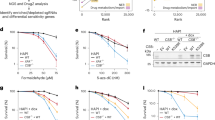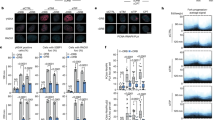Abstract
DNA methylation is an epigenetic modification that is essential for gene silencing and genome stability in many organisms. Although methyltransferases that promote DNA methylation are well characterized, the molecular mechanism underlying active DNA demethylation is poorly understood and controversial1,2. Here we show that Gadd45a (growth arrest and DNA-damage-inducible protein 45 alpha), a nuclear protein involved in maintenance of genomic stability, DNA repair and suppression of cell growth3,4, has a key role in active DNA demethylation. Gadd45a overexpression activates methylation-silenced reporter plasmids and promotes global DNA demethylation. Gadd45a knockdown silences gene expression and leads to DNA hypermethylation. During active demethylation of oct4 in Xenopus laevis oocytes5, Gadd45a is specifically recruited to the site of demethylation. Active demethylation occurs by DNA repair and Gadd45a interacts with and requires the DNA repair endonuclease XPG. We conclude that Gadd45a relieves epigenetic gene silencing by promoting DNA repair, which erases methylation marks.
This is a preview of subscription content, access via your institution
Access options
Subscribe to this journal
Receive 51 print issues and online access
$199.00 per year
only $3.90 per issue
Buy this article
- Purchase on Springer Link
- Instant access to full article PDF
Prices may be subject to local taxes which are calculated during checkout




Similar content being viewed by others
References
Bird, A. DNA methylation patterns and epigenetic memory. Genes Dev. 16, 6–21 (2002)
Kress, C., Thomassin, H. & Grange, T. Local DNA demethylation in vertebrates: how could it be performed and targeted? FEBS Lett. 494, 135–140 (2001)
Carrier, F. et al. Gadd45, a p53-responsive stress protein, modifies DNA accessibility on damaged chromatin. Mol. Cell. Biol. 19, 1673–1685 (1999)
Hollander, M. C. & Fornace, A. J. Genomic instability, centrosome amplification, cell cycle checkpoints and Gadd45a. Oncogene 21, 6228–6233 (2002)
Simonsson, S. & Gurdon, J. DNA demethylation is necessary for the epigenetic reprogramming of somatic cell nuclei. Nature Cell Biol. 6, 984–990 (2004)
Escher, G. et al. Demethylation using the epigenetic modifier, 5-azacytidine, increases the efficiency of transient transfection of macrophages. J. Lipid Res. 46, 356–365 (2005)
Shou, W. & Dunphy, W. G. Cell cycle control by Xenopus p28Kix1, a developmentally regulated inhibitor of cyclin-dependent kinases. Mol. Biol. Cell 7, 457–469 (1996)
Yeom, Y. I. et al. Germline regulatory element of Oct-4 specific for the totipotent cycle of embryonal cells. Development 122, 881–894 (1996)
Hattori, N. et al. Epigenetic control of mouse Oct-4 gene expression in embryonic stem cells and trophoblast stem cells. J. Biol. Chem. 279, 17063–17069 (2004)
Gidekel, S. & Bergman, Y. A unique developmental pattern of Oct-3/4 DNA methylation is controlled by a cis demodification element. J. Biol. Chem. 277, 34521–34530 (2002)
Furukawa, T. et al. Densely methylated MLH1 promoter correlates with decreased mRNA expression in sporadic colorectal cancers. Genes Chromosom. Cancer 35, 1–10 (2002)
Li, Q., Ahuja, N., Burger, P. C. & Issa, J. P. Methylation and silencing of the Thrombospondin-1 promoter in human cancer. Oncogene 18, 3284–3289 (1999)
Fang, J. Y., Lu, J., Chen, Y. X. & Yang, L. Effects of DNA methylation on expression of tumor suppressor genes and proto-oncogenes in human colon cancer cell lines. World J. Gastroenterol. 9, 1976–1980 (2003)
Jaenisch, R. et al. Nuclear cloning, epigenetic reprogramming, and cellular differentiation. Cold Spring Harb. Symp. Quant. Biol. 69, 19–27 (2004)
Prives, C. & Foukal, D. Use of oligonucleotides for antisense experiments in Xenopus laevis oocytes. Methods Cell Biol. 36, 185–209 (1991)
Rhee, I. et al. CpG methylation is maintained in human cancer cells lacking DNMT1. Nature 404, 1003–1007 (2000)
Smith, M. L. et al. Interaction of the p53-regulated protein Gadd45 with proliferating cell nuclear antigen. Science 266, 1376–1380 (1994)
Smith, M. L. et al. Antisense GADD45 expression results in decreased DNA repair and sensitizes cells to u.v.-irradiation or cisplatin. Oncogene 13, 2255–2263 (1996)
Choi, Y. et al. DEMETER, a DNA glycosylase domain protein, is required for endosperm gene imprinting and seed viability in Arabidopsis. Cell 110, 33–42 (2002)
Jost, J. P. et al. 5-Methylcytosine DNA glycosylase participates in the genome-wide loss of DNA methylation occurring during mouse myoblast differentiation. Nucleic Acids Res. 29, 4452–4461 (2001)
Gong, Z. et al. ROS1, a repressor of transcriptional gene silencing in Arabidopsis, encodes a DNA glycosylase/lyase. Cell 111, 803–814 (2002)
Weiss, A., Keshet, I., Razin, A. & Cedar, H. DNA demethylation in vitro: involvement of RNA. Cell 86, 709–718 (1996)
Reardon, J. T. & Sancar, A. Nucleotide excision repair. Prog. Nucleic Acid Res. Mol. Biol. 79, 183–235 (2005)
Iyer, N., Reagan, M. S., Wu, K. J., Canagarajah, B. & Friedberg, E. C. Interactions involving the human RNA polymerase II transcription/nucleotide excision repair complex TFIIH, the nucleotide excision repair protein XPG, and Cockayne syndrome group B (CSB) protein. Biochemistry 35, 2157–2167 (1996)
Yi, Y. W. et al. Gadd45 family proteins are coactivators of nuclear hormone receptors. Biochem. Biophys. Res. Commun. 272, 193–198 (2000)
Issa, J. P. CpG island methylator phenotype in cancer. Nature Rev. Cancer 4, 988–993 (2004)
Hansis, C., Barreto, G., Maltry, N. & Niehrs, C. Nuclear reprogramming of human somatic cells by Xenopus egg extract requires BRG1. Curr. Biol. 14, 1475–1480 (2004)
Davidson, G. et al. Casein kinase 1 γ couples Wnt receptor activation to cytoplasmic signal transduction. Nature 438, 867–872 (2005)
Cimbora, D. M. et al. Long-distance control of origin choice and replication timing in the human β-globin locus are independent of the locus control region. Mol. Cell. Biol. 20, 5581–5591 (2000)
Acknowledgements
We thank L. Sitter for help in characterizing XPG; H. Clevers, N. Giese, H. Schöler, and J. Smith for reagents; and G. Davidson and H. Steinbeisser for helpful discussions. This work was funded by the Deutsche Forschungsgemeinschaft.
Author information
Authors and Affiliations
Corresponding author
Ethics declarations
Competing interests
Reprints and permissions information is available at www.nature.com/reprints. The authors declare no competing financial interests.
Supplementary information
Supplementary Information
This file contains Supplementary Figures S1-S8 with legends, Supplementary Methods with detailed information about the materials and methods used in this report and additional references. (PDF 655 kb)
Rights and permissions
About this article
Cite this article
Barreto, G., Schäfer, A., Marhold, J. et al. Gadd45a promotes epigenetic gene activation by repair-mediated DNA demethylation. Nature 445, 671–675 (2007). https://doi.org/10.1038/nature05515
Received:
Accepted:
Published:
Issue Date:
DOI: https://doi.org/10.1038/nature05515
This article is cited by
-
GADD45A regulates subcutaneous fat deposition and lipid metabolism by interacting with Stat1
BMC Biology (2023)
-
Gene body methylation in cancer: molecular mechanisms and clinical applications
Clinical Epigenetics (2022)
-
The long noncoding RNA TARID regulates the CXCL3/ERK/MAPK pathway in trophoblasts and is associated with preeclampsia
Reproductive Biology and Endocrinology (2022)
-
Lymphoid-specific helicase in epigenetics, DNA repair and cancer
British Journal of Cancer (2022)
-
Identification of activity-induced Egr3-dependent genes reveals genes associated with DNA damage response and schizophrenia
Translational Psychiatry (2022)
Comments
By submitting a comment you agree to abide by our Terms and Community Guidelines. If you find something abusive or that does not comply with our terms or guidelines please flag it as inappropriate.



